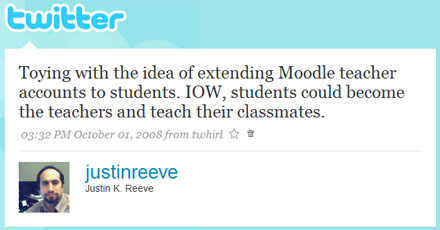Posts tagged Moodle
Turning Students Into Teachers with Moodle
8I’ve noticed a few differences in how our teachers and students use Moodle. The details may vary, but in general a teacher will log in, maybe upload a PowerPoint document, and if they’re adventurous they’ll set up an online quiz, and possibly a forum.
A student, on the other hand, logs in, and explores everything. One of the first things they’ll notice is their Profile page. They’ll edit their profile, upload a photo of themselves, and may even get creative and embed a cool Flash widget they like. Then they’ll pop into the class forum and post a message. They will return to this forum a few times throughout the day to continue talking to their classmates. They will then download the teacher’s course material, study it, and take the teacher’s quiz that’s been set up. They may then return to the forum to see if anyone responded to their messages, and maybe post another message to someone else, before uploading their daily homework assignment.
 See a pattern here? Students are the power users. The technology is familiar to our “digital natives,” and they enjoy using it. Some of our students have even panicked when the technology wasn’t available. Once our Moodle server went down for a reboot, and was offline only about 2 minutes when I received an IM from a teacher. She said the students were freaking out and asking “When will Moodle be back up?”
See a pattern here? Students are the power users. The technology is familiar to our “digital natives,” and they enjoy using it. Some of our students have even panicked when the technology wasn’t available. Once our Moodle server went down for a reboot, and was offline only about 2 minutes when I received an IM from a teacher. She said the students were freaking out and asking “When will Moodle be back up?”
So I had a thought the other day:
Teachers can manage classes in Moodle, but why not students? People often learn best when they teach, and it seems like we’re only targeting half our potential audience here. We could turn the students into teachers, and let them teach their classmates. It would be a great way to create effective learners.
A teacher could use this as a classroom activity. They could assign students to “teach” a particular topic they’re studying in class, and the student could create video presentations, quizzes, wikis, and other course material in their own Moodle course. They will become better learners through teaching, and we will be preparing them for college by introducing them to their online classroom space.
Not Just for In-Class
 But online student-teaching could extend beyond the classroom as well. Under the sponsorship and mentoring of a teacher, a student could teach about any subject that interests them, whether it be athletics, books, auto repair, video games, woodworking, painting, animation, music, and more. Imagine a whole network of students teaching about a diverse range of topics. Other students could browse the available courses their peers are instructing, enroll, and contribute to a system where student interests and knowledge are shared in a constructive, educational manner. Moodle could become the focal point of a vibrant student learning network.
But online student-teaching could extend beyond the classroom as well. Under the sponsorship and mentoring of a teacher, a student could teach about any subject that interests them, whether it be athletics, books, auto repair, video games, woodworking, painting, animation, music, and more. Imagine a whole network of students teaching about a diverse range of topics. Other students could browse the available courses their peers are instructing, enroll, and contribute to a system where student interests and knowledge are shared in a constructive, educational manner. Moodle could become the focal point of a vibrant student learning network.
A rewards system may provide an added incentive to this “Young Teachers” program. Example: for every student that signs up for a course, the student-teacher earns points. If enrollees pass the course by taking an exam, the student-teacher earns even more points. Those who pass a student-made course could earn “attendee points” and receive certificates for passing. At the end of the year, we could give out prizes for those who’ve earned the most points, or hold an awards ceremony to recognize the best student-teachers.
With the right motivation, we would have no problem finding students interested in teaching their own classes.
Is This Really “Educational?”
The very nature of having students teaching courses is educational, because we’d be placing them in managerial roles as they organize their online classrooms. They would set up their course how they want, determine the best method of teaching and presenting the material, and create quizzes to make sure the other students understand what they are teaching. They could even organize activities through their online classroom. For example, a student teaching a class on theatre arts could set up a date to have everyone attend a local play. A student teaching a class on poetry could set up an online chat session with an English professor his family knows. There are numerous possibilities here.
At the same time, some questions need to be asked. Since this may be extracurricular for students, do we need to worry about keeping all student-taught courses within the state core curriculum? Also, it might not really be considered “educational” to let students teach a class on, e.g., video games, and just discuss strategies for Halo 3, when they could be teaching concepts of video game design and providing helpful tutorials and tools for independent game development. Clear goals should be outlined and standards set forth, so the teacher mentors can guide the students toward education-appropriate courses.
Benefits
- Students would become more actively involved in the educational process, both on the receiving and giving end.
- We would be preparing students for college by promoting self-directed learning, and introducing them to the online class environment.
- Studies have shown that online learning opportunities can encourage even the normally reticent students to participate in class.
- The beginnings of a student learning network would be created.
- Students would develop organizational leadership skills.
- Students would earn the recognition of their teachers, parents, and peers.
- Students would find it motivating and empowering to maintain their own online classroom about a subject that interests them.
- Students would have a valuable portfolio of their work.
- Parents could visit their student’s course and follow the progress.
Teacher Mentors
Each school could have one or two teacher mentors for these student-created courses. They would be responsible for the following:
- Hearing and approving student course requests.
- Creating the student course in Moodle.
- Making sure students understand the rules for their course, such as appropriate behavior (no offensive material or language) and resources they can use, breadth requirements for the “passing” exam, etc.
- Being available for questions about appropriate course material and helping students with extracurricular activity planning if necessary.
- Periodically checking up on the students’ courses.

